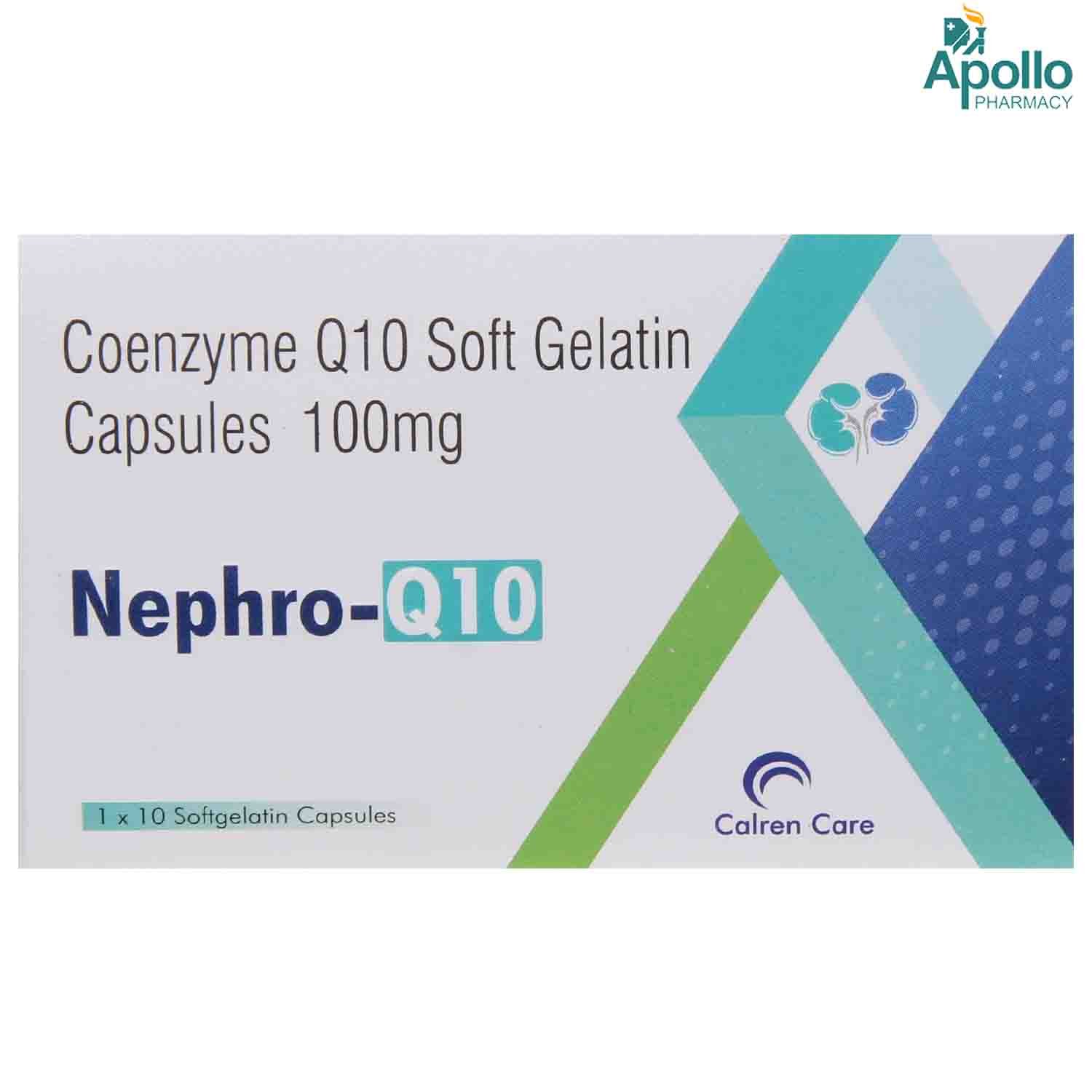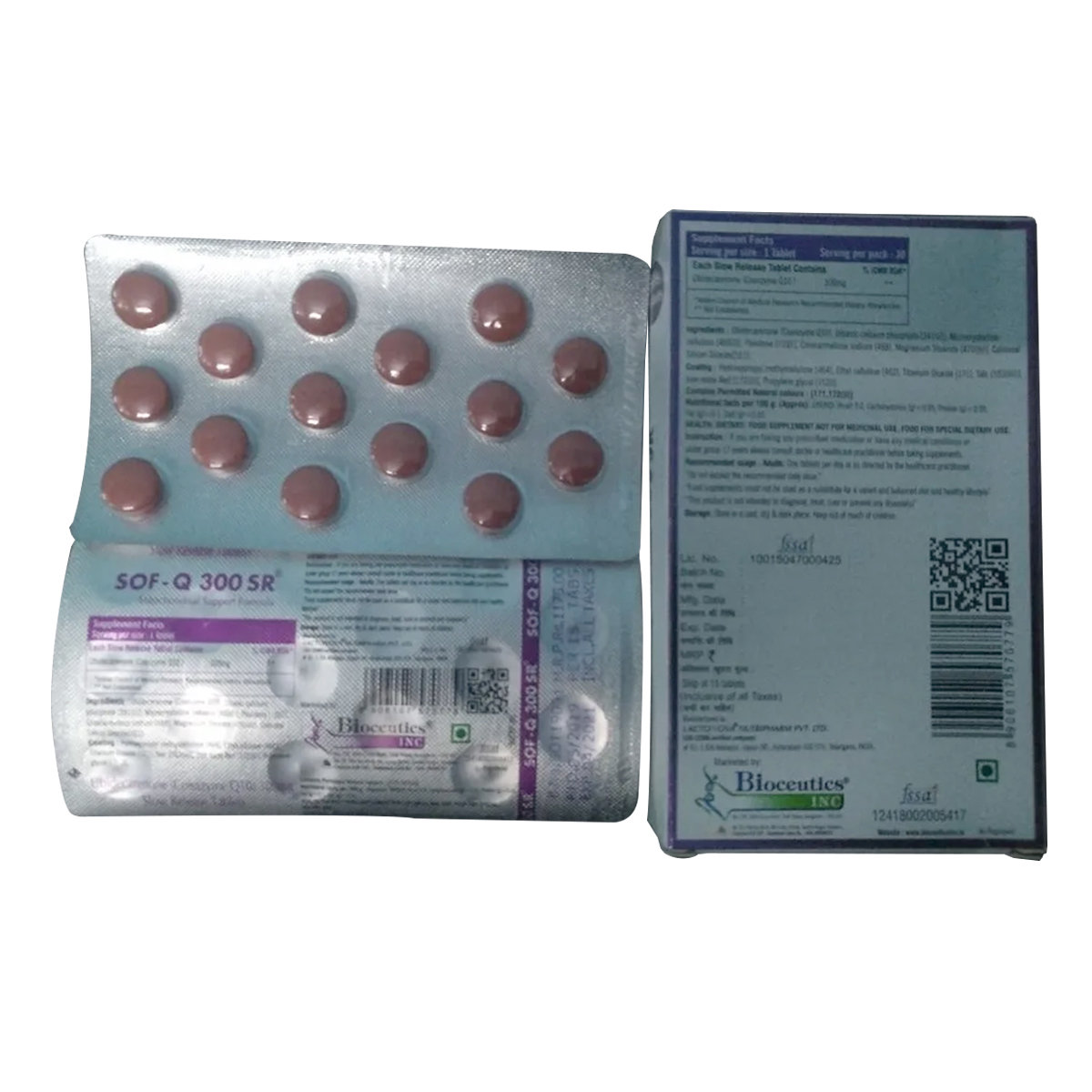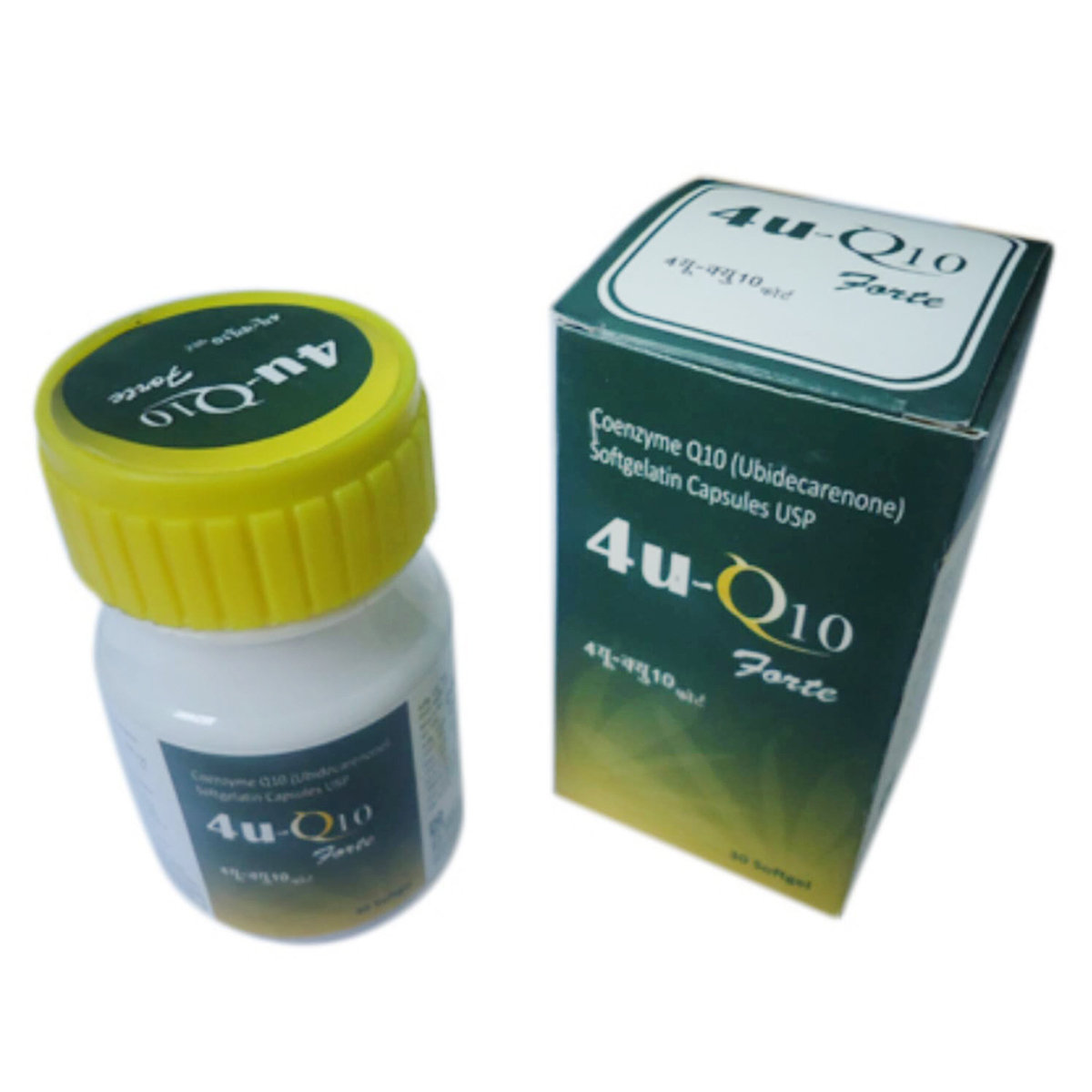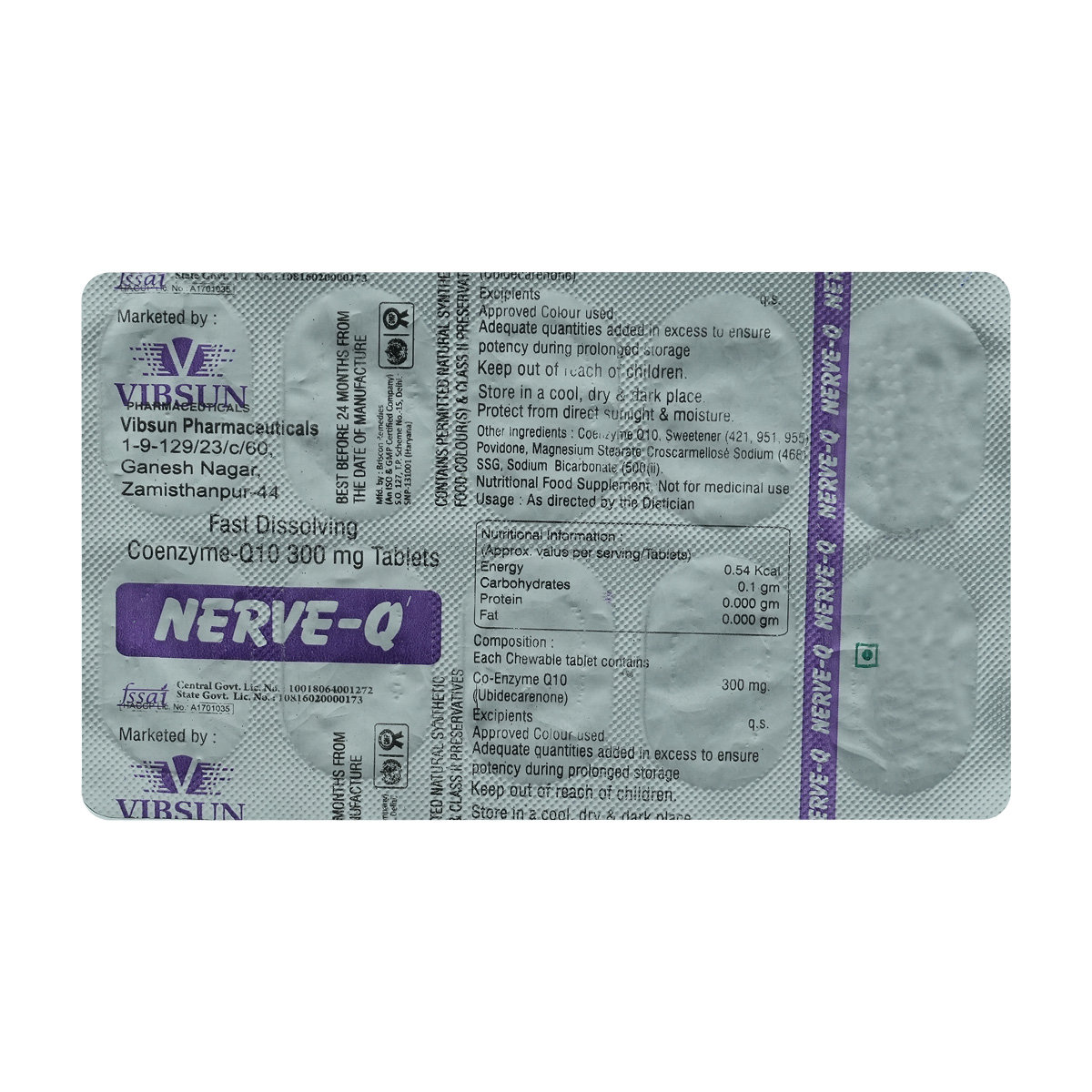Coenzyme Q10
About Coenzyme Q10
Coenzyme Q10 belongs to the class of medications called nutritional supplements used to treat various complications or long-term diseases due to Coenzyme Q10 deficiency. Coenzyme Q10 may also be used in preventing migraine headaches, preventing a second heart attack, lowering blood pressure, or slowing the progression of early Parkinson's disease. Coenzyme Q10 may also be possibly effective in improving symptoms in people with macular degeneration, congestive heart failure, nerve problems caused by diabetes, or muscular dystrophy.
Coenzyme Q10 contains Coenzyme Q10 which is also known as Ubidecarenone. It has antioxidant properties and prevents tissue damage, helps fight oxidative stress, slows down the effects of ageing, protects cognitive health, and improves metabolic functions and heart health. Coenzyme Q10 helps provide essential nutrients, thereby helps treat nutritional deficiency.
You are advised to take Coenzyme Q10 for as long as your doctor has prescribed it for you, depending on your medical conditions. In some cases, Coenzyme Q10 may cause certain common side effects like nausea, upset stomach, vomiting, loss of appetite, and diarrhoea. These side effects do not necessitate medical treatment and will fade away with time. However, if these side effects persist, you should seek medical help.
Inform your doctor if you are pregnant or a nursing mother. If you have malabsorption syndrome (difficulty absorbing nutrition from food), history of seizures (fits), liver disease, kidney disease, diabetes, heart problems, please inform your doctor before using Coenzyme Q10. Let your doctor know if you are using any prescription, non-prescription drugs, or herbal products before starting Coenzyme Q10.
Uses of Coenzyme Q10
Medicinal Benefits
Coenzyme Q10 belongs to the class of medications called nutritional supplements used to treat various complications or long-term diseases due to Coenzyme Q10 deficiency. Coenzyme Q10 may also be used in preventing migraine headaches, preventing a second heart attack, lowering blood pressure, or slowing the progression of early Parkinson's disease. Coenzyme Q10 may also be possibly effective in improving symptoms in people with macular degeneration, congestive heart failure, nerve problems caused by diabetes, or muscular dystrophy. Coenzyme Q10 has antioxidant properties and prevents tissue damage, helps fight oxidative stress, slows down the effects of ageing, protects cognitive health, and improves metabolic functions and heart health. Coenzyme Q10 helps provide essential nutrients, thereby helping treat nutritional deficiency.
Directions for Use
Storage
Side Effects of Coenzyme Q10
- Nausea
- Upset stomach
- Vomiting
- Loss of appetite
- Diarrhoea
Drug Warnings
If you are known to be allergic to Coenzyme Q10 or any other medicines, please tell your doctor. If you are pregnant or a nursing mother it is advised to consult a doctor before using Coenzyme Q10. If you have malabsorption syndrome (difficulty absorbing nutrition from food), a history of seizures (fits), liver disease, kidney disease, diabetes, or heart problems, please inform your doctor before using the Coenzyme Q10. Let your doctor know if you are using a prescription, non-prescription drugs, or herbal products before starting Coenzyme Q10.
Drug Interactions
Drug-Drug Interactions: Coenzyme Q10 may have an interaction with anticoagulant medication (anisindione, dicumarol, warfarin)
Drug- Food Interactions: No interactions found/established.
Drug-Disease Interactions: No interactions found/established.
Drug-Drug Interactions Checker List:
Safety Advice

Alcohol
cautionIt is not known whether it is safe to consume alcohol with Coenzyme Q10. However, as a precautionary measure, it is advisable to avoid/limit alcohol consumption.

Pregnancy
cautionCoenzyme Q10 is considered to be possibly safe to use during pregnancy. However, do not use this product without medical advice if you are pregnant.

Breast Feeding
cautionIt is not known whether Coenzyme Q10 passes into breast milk. Do not use this product without medical advice if you are breastfeeding a baby.

Driving
safe if prescribedCoenzyme Q10 does not have any reported interaction. Discuss with your doctor if you experience any difficulty.

Liver
cautionLimited information is available regarding the usage of Coenzyme Q10 in patients suffering from liver impairment. If you have any concerns, please consult your doctor. Your doctor will prescribe only if the benefits outweigh the risks.

Kidney
cautionLimited information is available regarding the usage of Coenzyme Q10 in patients suffering from kidney impairment. If you have any concerns, please consult your doctor. Your doctor will prescribe only if the benefits outweigh the risks.

Children
cautionLimited information is available regarding the usage of Coenzyme Q10 in children. Please seek medical advice from your doctor before using Coenzyme Q10.
Habit Forming
Diet & Lifestyle Advise
- Choose foods that are high in nutrients, such as fruits, vegetables, and whole grains.
- Replace fatty protein sources with lean alternatives and consume small amounts of healthy fat sources for optimum health.
- Your diet should contain vegetables, fruits, whole grains, legumes, omega-3-rich foods, and lean protein sources.
- Instead of saturated and trans fats, use monounsaturated and polyunsaturated fats (fish, nuts, and vegetable oils).
- Choose/prepare foods and beverages with fewer added sugars/caloric sweeteners.
- Limit your daily salt intake to no more than 2,300 mg.
Patients Concern
Disease/Condition Glossary
Coenzyme Q10 deficiency or Ubidecarenone deficiency: Coenzyme Q10 deficiency or Ubidecarenone deficiency is a disorder that can affect many parts of the body, especially the brain, muscles, and kidneys. As its name suggests, the disorder involves a shortage (deficiency) of a substance called Coenzyme Q10. Coenzyme Q10 deficiency can lead to seizures, poor muscle tone, intellectual disabilities, involuntary muscle contractions, and eye problems.
FAQs
Coenzyme Q10 has antioxidant property and prevent tissue damage, helps fight oxidative stress, slows down the effects of ageing, protects cognitive health, and improve metabolic functions and heart health.
Coenzyme Q10 is the only fat-soluble antioxidant that our body can produce. It is present in all the cells of our body, and its production is controlled by the same pathway that controls cholesterol synthesis. Coenzyme Q10 is present in many animal protein sources, vegetables, fruits and cereals. Animal hearts and livers represent the richest sources.
Two major contributing factors to a Coenzyme Q10 deficiency are age and the use of statins. As we get older, our ability to naturally produce Coenzyme Q10 reduces. Statin drugs can inhibit the body's natural production of Coenzyme Q10 during use. Statins block cholesterol synthesis, which is a key step for Coenzyme Q10 biosynthesis, and therefore it has been linked to a reduction in Coenzyme Q10 levels in the body.
Whilst everyone is different, people who have a deficiency in Coenzyme Q10 levels often experience physical fatigue and muscle weakness, even while undertaking relatively non-strenuous physical activities such as walking. Low Coenzyme Q10 levels can also cause mental fatigue, with symptoms including difficulty in concentrating and memory lapses.





.jpg?tr=q-85)





